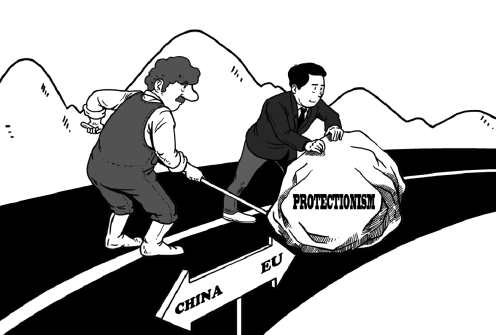Market economy status not a bilateral negotiation
Updated: 2016-02-18 07:55
By Yang Yanyi(China Daily)
|
||||||||
 |
|
LI FENG/CHINA DAILY |
Obviously the response to the challenges is up to each and every country. I only wish to share what we believe to be the best possible approach and option, and what China has been doing and will continue to do with regard to the issue.
First, digest the problem and not dump it onto other's doorsteps.
The development of the steel industry in China has been mainly to meet its domestic demand, rather than to export products to other countries.
To effectively deal with the overcapacity problems, China has taken tough measures to control new capacity. Painful as it is, China has cut its steel industry capacity by more than 90 million tons over the past few years and its investment in iron and steel assets by 13 percent last year. The growth of Chinese steel production has basically come to a halt.
To continue to address overcapacity in a serious and resolute manner, China has made elimination of overcapacity the top priority for this year and will cut the steel industry capacity by another 100 to 150 million tons.
Second, take the tackling of overcapacity as an opportunity to accelerate economic restructuring.
The Chinese word for "crises" is made up of two characters, crisis and opportunity. Guided by our conventional wisdom that opportunities are embedded in crises and that we must be good at getting to grips with them, China is pushing through essential reforms and restructuring against all the odds.
Being fully aware that much of China's industrial overcapacity is heavily concentrated at the lower end of the value curve, we have taken restructuring of the iron and steel sector as an important part of our endeavor to complete the difficult transition of moving China away from an investment-led economy to a consumer-oriented one.
China is actively restructuring the steel sector by eliminating outmoded capacity, creating exit strategies for "zombie companies" based on market rules, and encouraging promotion of innovation, technology, quality and management to meet production safety, energy consumption and environmental protection standards, and ensure the effective supply of high quality products.
In addition, we have put in place stricter supervision over local authorities to guard against excess production and tendency to protect enterprises with favorable policies.
Third, support the training and relocation of workers for new jobs to minimize the negative impacts of transformation.
Like elsewhere in the world, the pressure of globalization and reform and restructuring has had impacts on Chinese society. Restructuring of the iron and steel sector has given rise to concerns and worries. Yet, there is a common understanding that change for the better involves a price and pain.
This time around, the Chinese government has taken measures to help redundant labor change career paths. Among other things, the central government is setting up a special fund to retrain workers and support local government efforts to reduce overcapacity.
And with rebalancing underway in the Chinese economy and with numerous new industries emerging, it is far easier now to get new and better-paid jobs than it was in the late 1990s when the country's inefficient State-owned industries were reformed.
- Amid its worrying moves, EU granting China market economy status not a bilateral negotiation
- China urges EU to strictly follow WTO rules on anti-dumping investigations
- EU launches public consultation for granting China market economy status
- China spends more on R&D than EU for first time in 2014: OECD
- Global health entering new era: WHO chief
- Brazil's planning minister steps aside after recordings revelation
- Vietnam, US adopt joint statement on advancing comprehensive partnership
- European border closures 'inhumane': UN refugee agency
- Japan's foreign minister calls A-bombings extremely regrettable
- Fukushima impact unprecedented for oceans: US expert

 Stars of Lijiang River: Elderly brothers with white beards
Stars of Lijiang River: Elderly brothers with white beards
 Wealthy Chinese children paying money to learn British manners
Wealthy Chinese children paying money to learn British manners
 Military-style wedding: Fighter jets, grooms in dashing uniforms
Military-style wedding: Fighter jets, grooms in dashing uniforms
 Striking photos around the world: May 16 - May 22
Striking photos around the world: May 16 - May 22
 Robots help elderly in nursing home in east China
Robots help elderly in nursing home in east China
 Hanging in the air: Chongqing holds rescue drill
Hanging in the air: Chongqing holds rescue drill
 2.1-ton tofu finishes in two hours in central China
2.1-ton tofu finishes in two hours in central China
 Six things you may not know about Grain Buds
Six things you may not know about Grain Buds
Most Viewed
Editor's Picks

|

|

|

|

|

|
Today's Top News
Liang avoids jail in shooting death
China's finance minister addresses ratings downgrade
Duke alumni visit Chinese Embassy
Marriott unlikely to top Anbang offer for Starwood: Observers
Chinese biopharma debuts on Nasdaq
What ends Jeb Bush's White House hopes
Investigation for Nicolas's campaign
Will US-ASEAN meeting be good for region?
US Weekly

|

|








